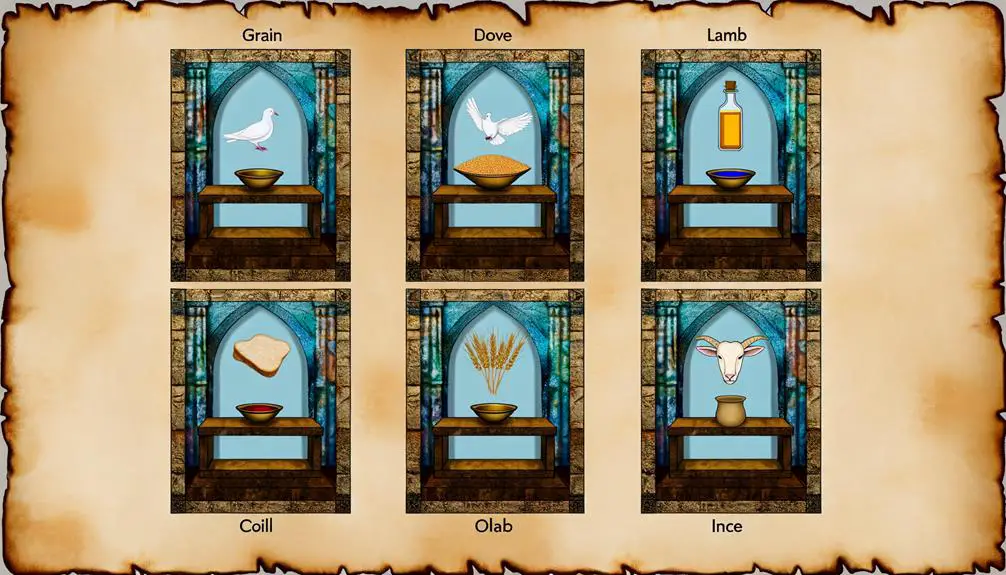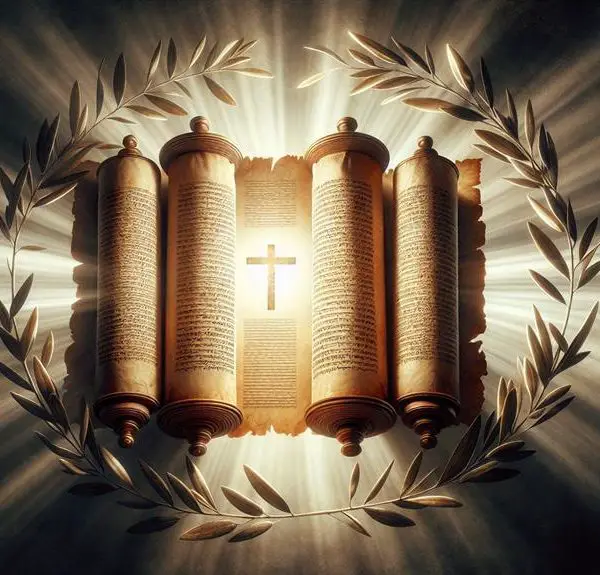Knead into the biblical essence as the number 5 unfolds mysteries of divine grace and faith, inviting deeper exploration.

What Does the Number 5 Mean in the Bible
Have you ever wondered why the number 5 repeatedly appears in the Bible with significant connotations?
From the Pentateuch, which lays the foundational laws of God, to the story of David and his five stones, this number weaves a thread of divine grace, provision, and faith throughout the scriptures.
It symbolizes more than just a quantity; it embodies a deeper, spiritual significance that has intrigued scholars and believers alike.
To fully grasp its implications, one must explore the various contexts in which it appears, each revealing a unique aspect of God's relationship with humanity.
Your journey into understanding the biblical significance of the number 5 starts here, beckoning you to uncover its mysteries and how it applies to your life.
Key Takeaways
- The number 5 symbolizes divine grace, favor, and acts of mercy from God.
- It represents the Pentateuch, highlighting the foundational role of the first five books of the Old Testament.
- Reflects the balance and connection between the divine and human, physical and spiritual realms.
- Signifies God's intervention in human affairs, emphasizing preparedness, faith, and victory.
The Pentateuch: God's Law Foundation

The Pentateuch, consisting of the first five books of the Bible, serves as the foundational cornerstone of God's Law, establishing the core principles and statutes that define the spiritual and moral obligations of the faithful. Traditionally attributed to Mosaic authorship, these texts not only recount the origins of the cosmos and humanity but also introduce the Covenant between God and His people, Israel. This pivotal relationship is underscored by the laws given to Moses on Mount Sinai, which include moral, civil, and ceremonial laws.
Your understanding of the Pentateuch is crucial as it lays down the groundwork for interpreting the rest of the Biblical narrative. The concept of covenant introduction within these books is seminal, marking a divine promise that shapes the identity and destiny of a chosen people. The covenant, which is repeatedly affirmed and expanded upon in subsequent scriptures, is first articulated here, setting a pattern of faithfulness, disobedience, and redemption that characterizes the entire Biblical storyline.
The emphasis on Mosaic authorship isn't merely a matter of historical record but speaks to the authority and authenticity of the laws and commandments contained within. These laws aren't presented as arbitrary edicts but as divine instructions meant for the well-being and holiness of God's people. As such, the Pentateuch's position at the beginning of the Bible underscores its role in defining the parameters of the covenant relationship between God and humanity, a theme that's central to the Biblical message as a whole.
In analyzing the Pentateuch, you're engaging with a text that's foundational not only to the Jewish faith but also to Christianity, offering insights into the character of God, the nature of sin, and the promise of redemption.
Five Loaves: Miraculous Provision

Building on the foundation laid by the Pentateuch's emphasis on divine provision and covenant, the narrative of the five loaves offers a profound illustration of God's continued miraculous sustenance to His people. This account, central to the New Testament, encapsulates the principles of sharing abundance and divine multiplication in a manner that is as instructive as it is miraculous.
The story, at its core, is a testament to the power of faith and the abundance that follows when we offer what little we have to God. The act of Jesus multiplying the five loaves to feed thousands is not merely a demonstration of His divine power but also a symbolic representation of the overflowing generosity that characterizes the kingdom of God.
Aspect |
Significance |
|---|---|
Five Loaves |
Symbol of God's provision |
Miraculous Multiplication |
Manifestation of divine power |
Feeding the Multitude |
Embodiment of sharing abundance |
Disciples' Role |
Agents in divine distribution |
This narrative encourages you to reflect on the concept of divine multiplication in your life. It challenges the notion of scarcity, advocating instead for a mindset of abundance rooted in faith and the willingness to share. The five loaves do not just feed; they overflow, underscoring the idea that what is given to God in faith will be returned manifold.
In this light, the five loaves become more than a mere detail. They symbolize the boundless generosity of God and the potential for divine multiplication in your own life when you commit to sharing abundance with those around you.
Five Offerings: Atonement and Grace

Delving into the significance of the five offerings, we uncover layers of meaning related to atonement and grace that are foundational to understanding biblical theology. These offerings, meticulously detailed in the Old Testament, serve as a profound testament to the sacrificial significance embedded within the scriptures. Each offering carries its unique symbolism, pointing toward the concepts of divine mercy and the necessity of atonement for sin.
The five offerings include:
- Burnt Offering: Symbolizes total surrender, emphasizing the worshipper's complete dedication to God.
- Grain Offering: Represents thanksgiving and the acknowledgment of God's provision, highlighting the importance of giving back to the Creator.
- Peace Offering: Reflects reconciliation and fellowship with God, underscoring the restoration of relationship through sacrificial acts.
- Sin Offering: Addresses the purification and forgiveness of sin, focusing on the individual's cleansing from transgressions.
- Guilt Offering: Deals with restitution, underlining the necessity of making amends for wrongdoing.
Through these offerings, the biblical text elaborates on the intricate relationship between humanity and the divine, illustrating how sacrificial practices serve as a conduit for atonement and grace. The emphasis on these rituals demonstrates the profound understanding of human imperfection and the overarching need for divine mercy. The sacrificial system, therefore, isn't merely a set of religious rites but a deeply symbolic reflection of the human condition and the divine provision for redemption. Through this lens, the number five emerges not just as a numeral but as a symbol of hope, pointing toward the ultimate act of atonement in Christian theology.
Five Wise Virgins: Preparedness and Faith

In examining the parable of the five wise virgins, we uncover essential themes of preparedness and faith, pivotal to understanding Christian vigilance and readiness. This narrative, steeped in matrimonial symbolism, serves as a powerful allegory for the kingdom of heaven, emphasizing the necessity of spiritual vigilance in anticipation of Christ's return. The five wise virgins, equipped with oil for their lamps, are prepared for the bridegroom's arrival, unlike their foolish counterparts. This distinction underscores a profound lesson in maintaining one's faith and readiness for the unforeseeable moment of divine encounter.
The oil in the parable symbolizes the Holy Spirit, highlighting the importance of being spiritually fueled and illuminated. This preparation isn't a passive waiting but an active, conscious effort to remain in a state of grace and readiness. The matrimonial symbolism here is rich, portraying the church as a bride prepared and eagerly awaiting the return of Christ, the bridegroom. This imagery reinforces the covenantal relationship between God and His people, marked by loyalty, anticipation, and preparedness.
Moreover, the emphasis on the number five in this context aligns with other biblical instances where the number symbolizes grace, responsibility, and divine favor. The five wise virgins embody the integration of grace and personal responsibility, illustrating that faith isn't merely a gift but a practice that requires diligence, foresight, and active engagement.
Through this parable, believers are called to a life of spiritual vigilance, marked by an unwavering commitment to faith and readiness for the culmination of their spiritual journey. The narrative serves as a timeless reminder of the virtues of preparedness and faith, essential for navigating the spiritual path with wisdom and foresight.
David's Five Stones: Victory and Faith

Reflecting on David's choice to select five stones before facing Goliath, we see a profound interplay between divine faith and human action, epitomizing victory through belief. This moment isn't merely an instance of a shepherd boy's bravery but a symbolic preparation that underscores the significance of the number five within biblical narratives. David's act of selecting five stones, despite needing only one for Goliath's defeat, resonates deeply with themes of preparedness, faith, and ultimate victory.
The narrative of David and Goliath stands as a testament to the power of faith over might, where Goliath's defeat isn't just a physical conquest but a spiritual victory symbolizing God's supremacy and the importance of faith in achieving the impossible. This story, rich in symbolic gestures, offers several layers of interpretation, particularly in the context of the number five:
- Preparedness: David's selection of five stones signifies a readiness for battle, embodying the principle that spiritual and physical preparations are integral to overcoming challenges.
- Faith: The act represents unwavering faith in God's providence, where David's choice reflects a deep trust in divine support rather than reliance on human strength alone.
- Victory: It symbolizes the certainty of victory through faith, emphasizing that success is attainable when actions are anchored in a strong belief system.
Through this lens, David's symbolic preparation with five stones before confronting Goliath transcends a mere biblical anecdote. It becomes a profound lesson on the intertwining of faith and action, reminding us that victories are secured not by strength, but through a steadfast belief in the divine.
Frequently Asked Questions
How Does the Number 5 Symbolize Marriage and Unity in Biblical Context?
In exploring how the number 5 represents marriage and unity in a biblical context, you'll find it's deeply intertwined with wedding customs and unity symbols.
This number often signifies God's grace, implying a harmonious bond in marriage symbolized through biblical narratives and rituals.
It suggests a divine favor upon the union, emphasizing the spiritual and physical unity of the couple.
Thus, the number 5 holds significant symbolism in celebrating and understanding marital unity.
In What Ways Does the Number 5 Represent Human Weakness or Imperfection in the Bible?
In the Bible, the number 5 often symbolizes human weakness and imperfection. This interpretation stems from the association with the pentagon's symbolism, representing the frailties of the human condition.
Additionally, the exploration of the five senses in biblical narratives underscores our limitations and susceptibility to temptation. Through these elements, the number 5 serves as a reminder of humanity's need for divine grace and strength to overcome inherent weaknesses.
Are There Any Prophetic Implications of the Number 5 in the Book of Revelation?
In the Book of Revelation, you'll find that the number 5 holds significant prophetic implications, starkly contrasting human imperfection with divine intervention. Specifically, the text references five plagues, symbolizing judgment and purification, alongside angelic appearances, denoting guidance and revelation.
This juxtaposition underscores a deeper, scholarly understanding of divine justice and mercy. Analyzing these elements reveals how Revelation uses the number 5 to convey messages of impending change and hope.
How Is the Number 5 Used in the Dimensions and Construction of the Tabernacle?
In analyzing the tabernacle's construction, you'll find the number 5 significantly influences both the materials used and the offering amounts. This pattern highlights a deeper, symbolic meaning, underscoring the meticulous design and spiritual significance behind each element.
The recurrence of 5 in measurements and contributions isn't arbitrary but reflects a deliberate choice, weaving a complex narrative of faith and devotion within the fabric of this sacred space.
What Significance Does the Number 5 Have in the Genealogies Listed in the Bible?
Ever wondered how genealogies in the Bible might hold deeper meanings?
When you delve into the family lineage listings, you'll notice numerical patterns that aren't just coincidental.
Specifically, the number 5 frequently emerges, symbolizing grace, favor, and balance within these genealogical records.
This isn't arbitrary; it's a reflection of a sophisticated, divinely inspired structure, showcasing a profound connection between numbers and theological concepts in the scripture's narrative.
Conclusion
In sum, the biblical significance of the number five is firmly founded in faith, featuring prominently from the Pentateuch to the parables. It symbolizes God's grace and guidance, from the giving of the law to the gift of loaves, the guidelines for atonement to the gospel of grace, and from David's daring deeds to the discernment of the dedicated virgins.
Each instance invites introspection on the integral role of preparedness, provision, and victory in the virtuous life of faith.



Sign up